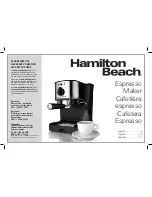
Before you use your appliance for the first time
• Remove the accessories and any stickers either
inside or on the outside of the appliance -
A
.
• Clean all of the parts and the appliance itself
using a damp cloth.
Quick-start
• Fully unwind the power cord and plug it into
a grounded socket.
• A slight odor may be given off when used for
the first time.
• Remove the bread pan by lifting the handle
and turning the bread pan slightly anti-clock-
wise. Then insert the kneading paddle -
B
-
C
.
• Put the ingredients in the pan in exactly the
order recommended. Make sure that all ingre-
dients are measured with precision -
D
-
E
.
• Place the bread pan in the breadmaker. By
holding the bread pan by handles, insert it in
the breadmaker so that it fits over the drive
shaft (you will need to tilt it slightly to one
side to do this). Turn it gently clockwise and it
will lock into place -
F
-
G
.
• Close the lid. After you hear the beep, program
1 will appear on the display as the default set-
ting, i.e. 2 lbs, medium browning -
H
.
• Press the
button. The timer colon flashes.
The operating indicator lights up -
I
-
J
.
• Unplug the breadmaker at the end of the
cooking or warming cycle. Lift the bread pan
out of the breadmaker. Always use oven
gloves as the pan handle is hot, as is the inside
of the lid. Turn out the hot bread and place it
on a rack for at least 1 hour to cool -
K
.
To get to know your breadmaker, we suggest trying the BASIC WHITE BREAD recipe for
your first loaf (refer to the recipe section).
- if the dough is too wet and sticks to the
sides, you may need to add a little flour.
Such corrections should be undertaken very
gradually (no more than 1 tablespoon at a
time) and wait to see if there is an improve-
ment before continuing.
• A common error is to think that adding
more yeast will make the bread rise more.
Too much yeast makes the structure of the
bread more fragile and it will rise a lot and
then fall while baking. You can determine the
state of the dough just before baking by
touching it lightly with your fingertips: the
dough should be slightly resistant and the fin-
gerprint should disappear little by little.
7
Tfal-ODM-US-NC00111292 09/05/12 15:52 Page7
Summary of Contents for NC00111292
Page 1: ...www t fal com BREAD MAKER Tfal ODM US NC00111292 09 05 12 15 52 Page1...
Page 2: ...1 2 3 4 2b 2a 2c 2d 2 5 7 6 6a 6b 2g 2e 2f Tfal ODM US NC00111292 09 05 12 15 52 Page2...
Page 3: ...3 A D E F G H I J K L B C 2c 2d 2e 2f Tfal ODM US NC00111292 09 05 12 15 52 Page3...
Page 28: ...Ref NC00111292 www t fal com Tfal ODM US NC00111292 09 05 12 15 52 Page28...








































